Egg Donation
Support and information on egg donation, including information about how to include the DSR in your recipient/donor contract.
DSR/Clinic Egg Donation Contracts/Consent Forms
Many egg donor agencies and clinics are now writing the Donor Sibling Registry into their contracts/consent forms so that recipient parents and donors have anonymous (if wished) access to each other right from pregnancy or birth.
The advantages of using the DSR include the fact that our permanent membership price is only $199 for the recipient parents and $225 for the donor ($199 permanent membership and a $26 management fee). Both parties can contact each other at any time, with no middlemen. They can share photos and other pertinent information, such as medical updates, all while remaining private if wished. And, if the children have questions, they can contact the donor on the DSR (with their parents if under age 18) to receive the answers they're looking for.
Recipient parents and donors can connect anytime on the Donor Sibling Registry. Many donor children are curious long before their 18th birthday, and many thousands have made successful connections during their teen (and even earlier) years. We also understand that 18 is an arbitrary number and that parents know their children best regarding what age might be most appropriate for their child to reach out. This empowers everyone involved without having the clinic or a lawyer in charge of their family information.
Attorney Corlandos Scott made a video explaining how the Donor Sibling Registry works.
How It Works: Step-by-Step
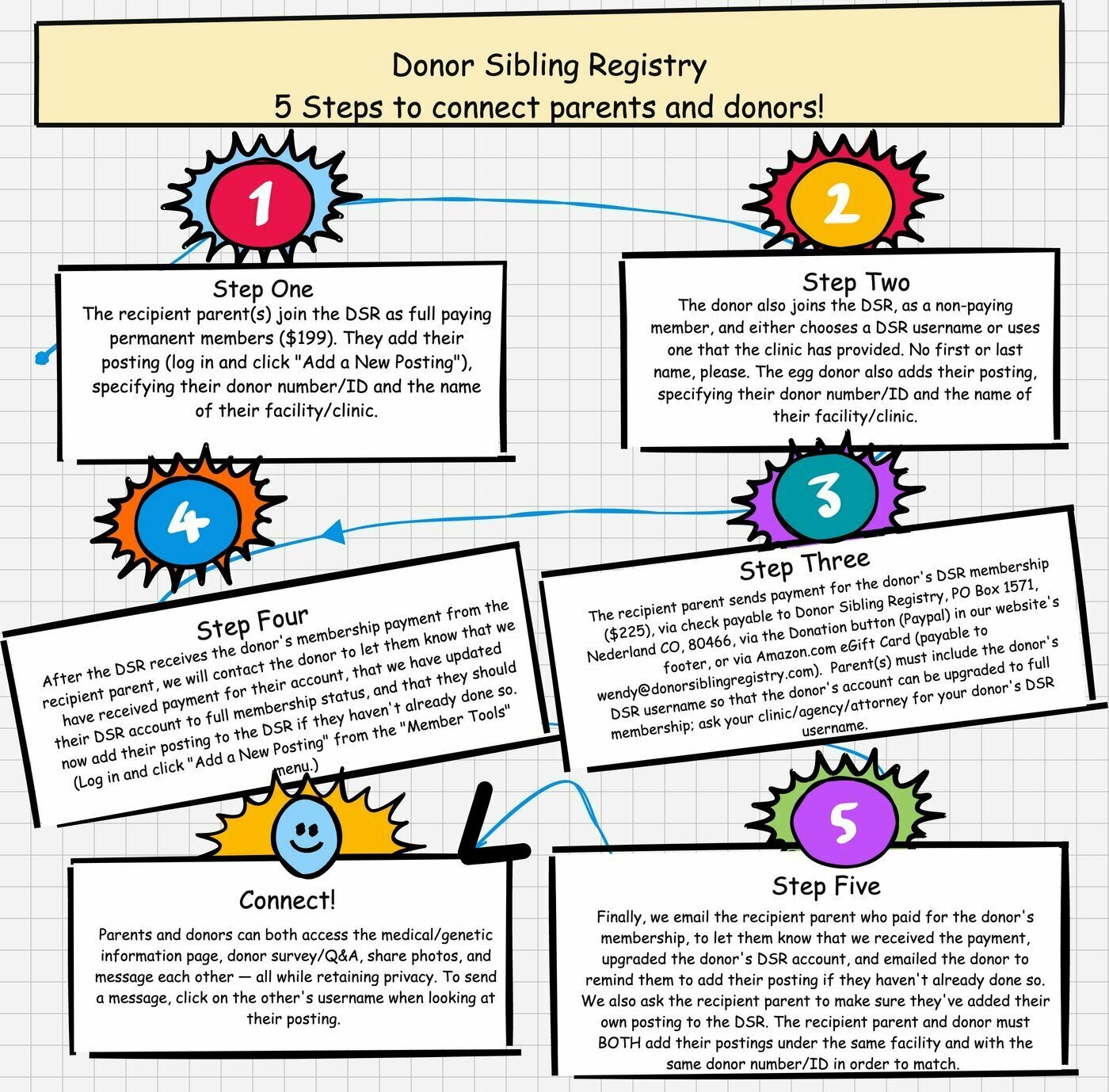
Sample Egg Donation Contract Verbiage

Method of Communication
The Parties agree that future communication will occur through the Donor Sibling Registry located at www.donorsiblingregistry.com. If the communication is for medical purposes described in paragraph [XX] of this Agreement, it may occur through the Donor Sibling Registry or through [clinic]. Donor agrees to register with the Donor Sibling Registry after receiving notice of a pregnancy which results from Donor’s performance under this Agreement. Intended Parent(s) agree to pay Donor’s membership fee with the Donor Sibling Registry.
Future Contact by the Child
Donor agrees to be contacted by the Child after the Child reaches the age of 18, or at any time, if the Child so desires. The Child may communicate with Donor through the Donor Sibling Registry or another mutually agreed upon method of communication. All correspondence on the DSR is anonymous.
Future Contact Between Intended Parent and Donor
If either Intended Parent or Donor desires contact with the other, they may communicate that desire through the Donor Sibling Registry. If the Parties are mutually agreeable to having contact, then they may communicate and share contact information through the Donor Sibling Registry or another mutually agreed upon method of communication.
Agreement Not to Seek Identifying Information Not Otherwise Disclosed
Donor agrees that he/she will not participate in any act or claim that may lead to the disclosure of information about Intended Parent or any Child other than that agreed upon in this Agreement or in the Parties' communications through the Donor Sibling Registry. Intended Parent agrees that he/she will not participate in any act or claim that may lead to the disclosure of Donor‘s contact information other than that agreed upon in this Agreement or in the Parties’ communications through the Donor Sibling Registry. NOTE: A donor-conceived person (or donor) can at any time submit her/his own DNA into a commercial DNA company and locate their genetic relatives in this way. Many donors have been located via DNA testing, so donors should know that there are no guarantees for anonymity.
Medical and Mental Health Information
The Donor has provided medical information to [clinic] and agrees to provide additional information if requested to do so in the future. Donor agrees to be contacted by Intended Parent through the Donor Sibling Registry, and by [clinic] if the child experiences a life-threatening or serious medical condition. Donor agrees to provide additional medical information at that time and will consider providing further assistance if requested to do so. If Donor discovers new medical or mental health information or any of Donor's children develop serious medical or psychological conditions that Donor’s physician has determined to be genetically related to Donor, Donor agrees to inform Intended Parent through the Donor Sibling Registry or to contact and inform [clinic] so they can inform Intended Parent. If any Child born from Donor’s eggs suffers serious medical or mental health conditions that may be genetically related to Donor, Intended Parent agrees to contact Donor through the Donor Sibling Registry or to contact and inform [clinic] so they can inform Donor.
Update Address and Contact Information
Intended Parent and Donor agree to keep [clinic] and the Donor Sibling Registry, and successors to any of these entities, informed of their address changes.
Conflict Between Documents
If any portion of Paragraph [XX] of this Agreement regarding future contact between Intended Parent, Child, and Donor conflicts with documents previously signed by the Parties with [clinic], the terms of this Agreement will prevail.
If you are looking for an attorney to draft your egg donor contract, please email Wendy for recommendations!
FAQs About Egg Donation Contracts


An annual update is a good idea, as well as when any new medical or genetic information becomes available about the egg donor or anyone in the egg donor's immediate family.

Absolutely! If a child has a medical or genetic condition, it is very important that the donor is notified. The sharing of medical information goes both ways — between all families and their donor and from the donor to the families. The DSR includes a medical page that the donor or families can add to, edit, or update when needed. All matching families can see this information. Matching families can also email and share photos, all anonymously. When new information is added to the shared medical page, all affected families are notified by the DSR.

We have a donor "Q&A" sheet with 25 or so of the questions that we hear most from offspring. Plus, the photos and medical pages. These are pages that only you two can see, not any other DSR members.

No. You only need to know your donor's DSR username. The donor signs up on the DSR with a username and password. Then, you send the DSR $225 for your donor's permanent membership (telling us your donor's username). We will then update your donor's account to permanent status, and your donor will be able to add a posting to the DSR. (To add a posting to the DSR, log in and click "Add a New Posting.") Recipients join the DSR and post the regular way. (Log in and click "Add a New Posting.") You both need to post with the same clinic and donor number so that you are matched to each other on the site — and then you can share all information anonymously. Intended parents and donors must BOTH add their postings to the DSR.

The recipient membership can be paid via credit card on the website, when you join. The recipient family can pay for the donor’s membership via check (payable to Donor Sibling Registry, PO Box 1571, Nederland CO, 80466), or via Amazon.com eGift Card (payable to wendy@donorsiblingregistry.com).

Your child can have access to the DSR through your username and password. This means that your child can have anonymous contact with your donor at any time.

Legally, no. Your child is not signing any agreement. Many clinics say that the contracts signed by the parents also apply to the offspring (even though the children have never signed any contracts), but this has not been tested in court — most likely because this claim has no merit.
Ethically, no. Many donor-conceived children have many questions about their ancestry, medical backgrounds, and genetics. It is a normal desire to want to know where you come from.
Consider the parallels to adoption — some adopted people are not curious, whereas some are very curious. Many donor-conceived children are curious at a young age. This curiosity doesn't mean that you are not the child's parent(s); it just means that they have questions with answers that might help them form their identities. Part of defining who you will become as an adult is knowing where you come from. A donor child feeling curious about and wanting to reach out to learn more about their ancestry, medical background, and first-degree genetic relatives should be honored and supported. Thousands of families with children under 18 have connected on the DSR with very positive results!

A key factor for many parents is that the donor agrees to be contacted by the child after the child reaches the age of 18 if the child wishes to do so. However, parents want to know who keeps the details of the donor for potential future contact by the offspring, as well as what records are kept (e.g., social security number or something like that in case there are future changes to phone, email, or address), and where the records are kept. Parents wonder whether the DSR keeps these records and will provide them to the child at age 18. Parents want to know how their child will be able to get the donor details in the future and how it can be ensured that the donor can be contacted even if they change their address, email, etc.
The DSR provides a link between the donor and the recipient family right from the start, so you can share information from day one — there is no need to wait until age 18. We feel that 18 is an arbitrary age set by the industry to cover their own liabilities. We have done enough research to know that contact before the age of 18 can be important, profound, and life-changing (and life-saving). After 16 years, 52,000 members and many research studies, we are baffled that this industry still works so hard to keep donors from the families.
The legal verbiage gives you a template so that you can then be empowered to decide how and when to have contact with your donor. We try and make it so that there is no middleman needed, so you need to set up the contract so that clear rules for contact are established right from the start. Many donors change their minds after 18 years, so it's ridiculous to ask a young donor to make decisions now, about how they will feel in 18 years. That's why establishing contact from the beginning can be crucial. The donor should have it in their contract to always keep their contact information current on the DSR.
We will always have the records (although we do not keep SS#s), but you don't have that type of contract with the DSR. We have never released personal information on any of our members. We feel it's the families and the donors who need to share this information with each other.

Ah, the "hit by a bus" clause. Although Wendy doesn’t have any plans to be hit by a bus ... if it's not her, someone else will be running the DSR. Unlike the sperm banks, clinics, and doctors (many have already destroyed records), our records will never be destroyed.

Whenever you want to. Some post before pregnancy, some during, and some wait until after a baby is born.
Recommendations

Success Stories
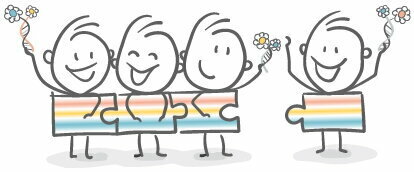
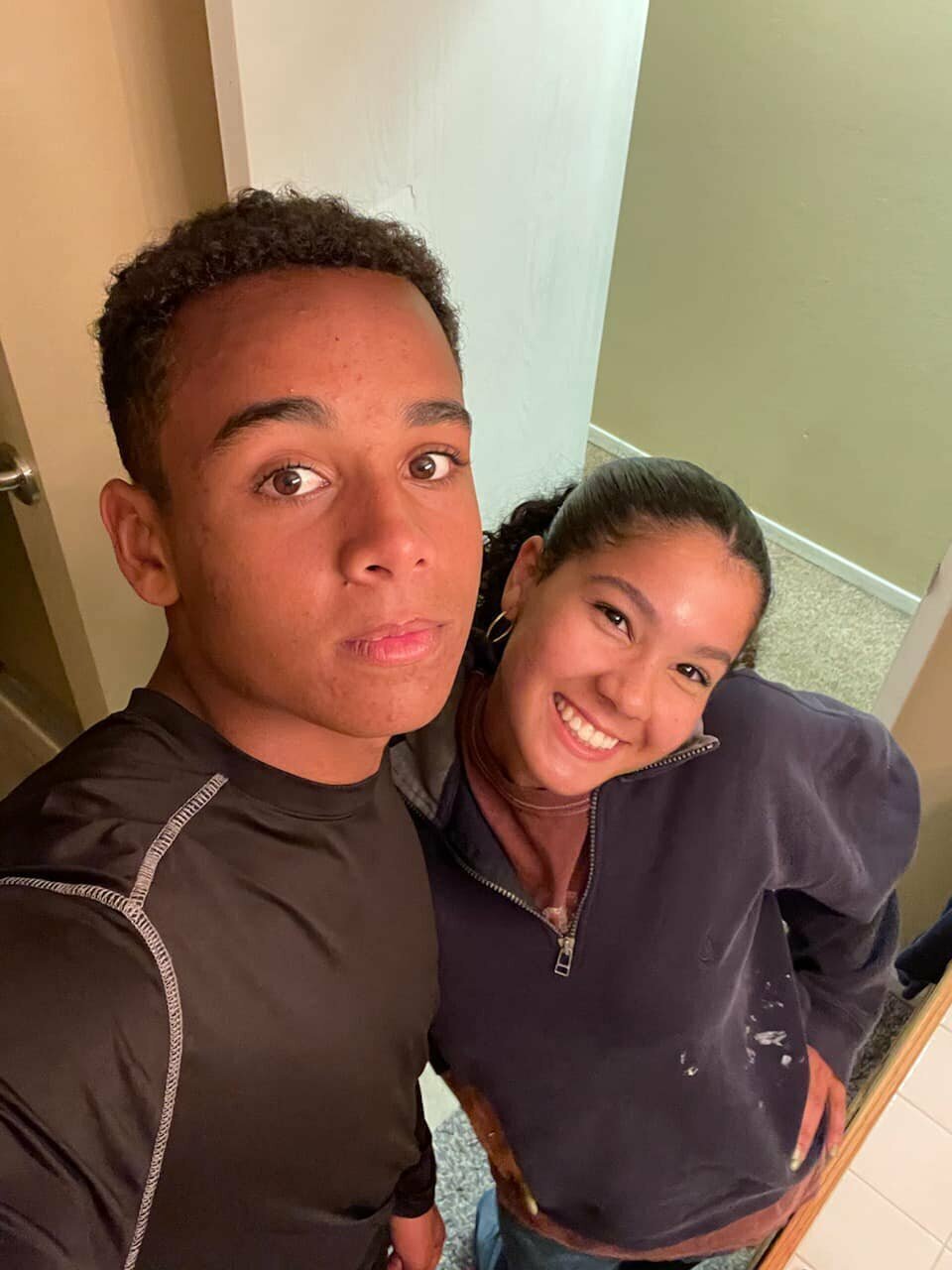
2022: From a Former Egg Donor, "These are two of my donor kids from my first donation in 2004. Imara was born in 2005 and Jackson was born in 2007. I joined DSR in June this year and Imara happened to as well. She had been searching for me since she found out they were DC two years ago. I’m so thankful for DSR for making it possible to connect. I’ve enjoyed getting to know them and they have been communicating with my personal children too. I look forward to attending Imara’s HS graduation in May 2023 and meeting them personally."
2014: The Katie Couric Show: This piece featured a teenager and her parents meeting their egg donor, and her two daughters, for the first time! Very emotional, and shows how important these connections can be — for all involved. Read about it in USA Today and in TheTennessean: Nashville Teen Finds Her Egg Donor. DSR members can watch the video on our Video Library page.
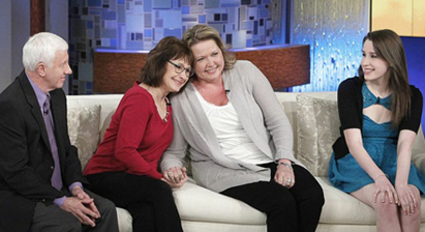
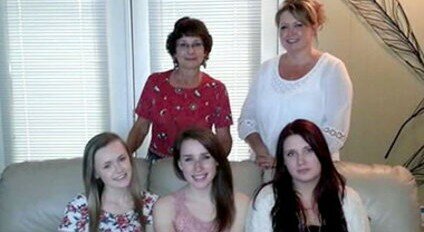
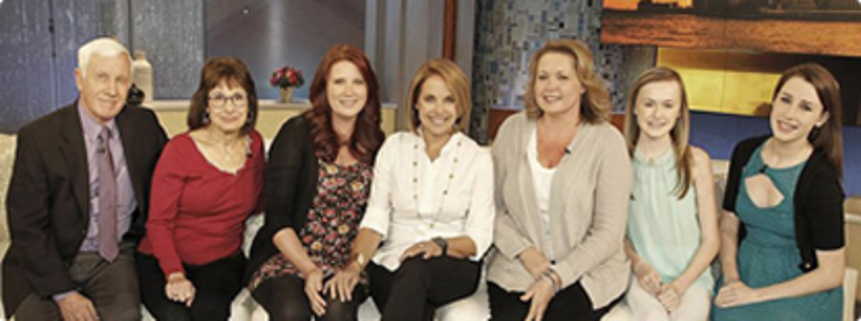
The same egg donor family, at a subsequent get-together.
Experiences of Egg Donors, Recipients, and Offspring

February 2025 from an egg donor: As an egg donor, I can tell you my story. 15 donations. All over 20 embryos were created for each donation. The last donation was 98 eggs, 46 embryos. A family has a couple of babies from each donation. So there are 15-30 babies without embryo adoption. I know of 16 families that have adopted embryos from clinics that have babies by my eggs. CNN did a special on this situation, and with their digging and fact checking, I am now at 46 confirmed live births. But that is definitely not all of them if the parents didn't report the birth. I had no long-term foresight for how this would all play out, and I feel very bad about it. Even though these people got to become parents.
February 2023 from an egg donor: I started off egg donation very adamant about never revealing my identity to any potential egg donor children, and to be completely honest I'm still on the fence. However, the stories I've read on this website and the mission they hold is very compelling so I am creating an account to prevent any future hurt or uncertainty for these children.
October 2021: from an egg donor: I have completed a total of 6 egg donations. Let me tell you, there is nothing more life-changing than this experience. I started out researching egg donating: How does it work? What is it really? What does it entail? I decided in high school that having children myself wasn't something that I wanted to do in this life. I didn't know at the time that there were so many people out there who wanted to have children and couldn't for more reasons than one.
Infertility. This word never really stuck to me until I started my journey of being an egg donor. I am blessed to be healthy, but deep down, I knew there was something more I could do. This is when I decided to look into egg donating. I have since then been matched twice on DSR. One of the recipients of my eggs is someone I have met and communicate almost daily with. It took communicating with one of my recipients to truly see the impact I have made in the life of this couple. I really started seeing the bigger picture. These eggs are the answers to many - many prayers of some people. "Positive pregnancy - give me a baby."
I am very thankful that I have been able to play such an important role to the couples who received my eggs. I hope to hear from them if they decide to educate their children about how they were conceived. I am grateful that these recipients chose me to hold such an important role in their lives. It is so rewarding to me to know that I have helped so many people in the short time that I have been on this Earth.
My relationship with one of my recipients is very strong. We communicate daily. The relationship I have with this couple is a bond I never even thought I could have. It isn't the typical relationship you have with a friend - cousin - wife - husband. It is an unexplainable bond and relationship that only someone else who has donated or received eggs from a donor would understand. My appreciation and respect go out to my recipients. I welcome anyone to reach out with any questions, as I am sure there will be many.
September 2020: From an egg-donor-conceived person: I was conceived with a donor egg at CCRM at the Lone Tree [CO] office in 1996. After finding out that I was donor-conceived in 2016, I immediately began searching for answers. My parents had very limited information yet were able to give me a basic packet with some medical information and characteristics about my donor. There was no donor number included and there was no photo. Even after reading it, I was intrigued to learn more as my donor did select that she would be interested in talking to me once I had turned 18. I figured that I could contact the office and they would help me get in contact with her, as that is what she consented to.
I initially contacted the office in 2016, and was given very short and cold answers. Originally they told me that the records were in another building, and then after I followed up with no response, they told me that there had been paperwork that had been lost. I continued to search for more answers and try and rely on them as they had all of the info and I figured they would be open to helping me. I couldn't have been more wrong.
After the lost paperwork scenario, they stated that they were unable to get in contact with her based off of the address she had provided in 1996. This made sense to me, but they gave me no support finding her new address, finding a new way of contacting her, or helping me navigate this situation. They were the people with all of the info, and I felt as though they genuinely had no interest in helping me search. I continued to contact them and email them, trying to get more information, and I even had one person at their office tell me that 'they had her packet and looked at her photo.'' After about a year of this back and forth contact, they told me that they felt as though they didn't know how to help me anymore. Within the past couple of months, I have begun working on my own to find my donor and have taken advantage of resources such as the DSR as well as Facebook groups for donor-conceived individuals. I ended up doing 23andMe in 2019 and through 23andMe I connected with a variety of individuals but it was difficult as none of them were closely related to me. I ended up having an individual in the group help me find my donor, who I was able to find within a day or so. We are now in contact and are going to meet — she always had wanted me to be able to contact her and it is frustrating for both of us that CCRM would not keep their word and help donor-conceived individuals find their donors when it was what the donor consented to.
This whole situation and search was extremely emotionally draining for me as I felt as though CCRM was not recognizing my own emotional needs or recognizing the rights that donor-conceived individuals should have. I had a really difficult experience working with them and I hope that CCRM can educate themselves more on the rights of donor-conceived individuals and how they are feeling.
January 2020: From an egg donor's mother: The DSR has been of enormous value in connecting donor-conceived half-siblings and in helping donor-conceived offspring and their donors find each other. For many people, these new family connections have been so positive and rewarding. Less often have we heard from grandparents, and that’s what I’d like to tell you about today. My daughter was an anonymous egg donor in her early 20s. Only a few years later she died of cancer. I didn’t know if her egg donations had ever produced children, and never expected to have any contact with them. After her death, I unexpectedly heard from 2 families who had come across my daughter’s obituary and, thanks to the information they had originally received from the egg donor agency (more than is currently provided!), along with the information that had become available by then on the Internet, they were able to find me. Their motivation at the time was to learn more about her cancer in order to see if their donor-conceived children were at risk. The result, however, was that I was able to meet these children and their parents. Over the past decade, I have been so grateful to have ongoing relationships with these children, who are now young adults. Like most grandparents, I very much enjoy having grandchildren, visiting them and having them visit me, interacting with them, and watching them grow up. And in addition, they are my strongest connection to my daughter — their genes, their physical resemblance, their interests, and their abilities. Knowing them has been a major blessing in my life. In addition, I grew up with very few relatives, but now I am a part of two more families. I feel close to the parents of these kids, enjoy visiting them, and am grateful that they have accepted me as a member of their families.
2015: From one of the oldest egg donor offspring on the DSR: I was conceived by a donor egg in 1988. My mom says she does not remember any of the basic information about the egg donor (ethnicity, medical history, etc). I have called the clinic where I was conceived multiple times, left messages, and never gotten a response back. The only information I have is the serial number of the petri dish I was made in because the clinic gave my mom the petri dish as a souvenir. I am G**80. I got that number tattooed on the back of my neck; I guess it was my way of trying to re-establish control and ownership of my own body after I had been told I had no legal rights (seeing as I was the product, and not one of the people involved) to my own genetic history and information. I love my mom and her family, but it has always been extremely obvious that I do not share genetic material with them; aside from physical appearance, we have absolutely nothing in common in terms of shared interests, aptitudes, dislikes, taste, or personal traits. We are polar opposites to a comical degree.
An egg donor joined the DSR with this heart-warming message: Egg donation is a part of my life that I hold near and dear to my heart. I'd love to connect with recipients to answer any questions they have about me and to potentially meet if thats what we mutually agree to. I'm passionate about doing this and have taken this responsibility very seriously. I feel I've finally gotten the courage to join the registry because it's the right time. I'm excited to potentially open my heart and family to new individuals who I feel a strong connection to without knowing anything about them. Please message me if you feel I'm your donor!
If you're thinking about donating and already have or will have a family of your own, consider this message from an egg donor's child: Years ago my mom sold her eggs to help pay rent and give us a good holiday (we weren’t doing well at the time). I was around 7 at the time and didn’t understand until now how big of a deal that was. I’m 14 now and it keeps me up at night that I have 1 or more siblings out there. I’ve been reading stories online about how donor siblings found each other and it literally brought tears to my eyes. I want to meet them so bad and it makes me upset thinking I could go my entire life without meeting someone related to me. I wanna know what they’re like ... so bad. I can’t even describe how much I want to meet them ... it hurts a little. I’ve talked to my mom about this and she says just leave it alone and don’t think about it too much ... but it’s hard. She doesn’t know I’m looking for them on here and I don’t know if I’ll find them but I wanna try.
A former egg donor reports: When I explained why I wanted [my donor number], I was told [by the clinic] that reunions typically do not go well and that I should not pursue the matter further.
Note from the DSR: This is nothing more than a fear tactic used by facilities looking to protect their own best interests (liabilities). We have thousands of testimonials, media stories, articles, and published research (peer-reviewed) on the DSR website showing successful, enriching, and life-changing connections between half-siblings and between donors and offspring. No matter what type of contract you signed with your egg clinic/agency, and no matter how they may advise against it, you always have the right to make yourself available for mutual consent contact on the DSR.
Another former egg donor reports: Some fellow egg donors in an ED group admitted to lying and/or purposefully withholding information on their applications so they could be accepted. One ED even told another potential ED how many days to be off her meds so she could clear any screening done. It's not just sperm donors who cheat to make a buck. There needs to be far more accountability.
Sharing medical information on the DSR can be extremely important. Here are some examples of the need to provide updated medical info:
2016: As a donor, I updated my medical records between donations. They did not pass those updates on to previous recipients NOR recipients that came after those updates. I only know that because a family that came after that insisted on contact. She showed me all of the info she had gotten on me. Those updates were not included. Any of the updates I have done since have not been passed on to her either.
2016: I was an egg donor over 20 years ago. I called the office where I donated and let them know about my son having ADHD, anxiety, bipolar, etc. so they could let the offspring's family know. I am assuming because it was 100% confidential ... they really didn't seem like they were interested or were going to pass the information on.
2016: I donated my eggs four different times at Genetics & IVF Institute in Fairfax, VA in the 90s/early 00s. Since then I discovered I carry a gene which means I'm at a much higher risk of getting several types of cancer. Since then I've tried to contact Genetics & IVF Institute so that they can relay this information to my offspring (they have a 50/50 chance of inheriting it), but they were not interested and it was obvious that they were not going to inform the families despite the fact that early screening could potentially save these children's lives. I've recently turned 42 years old and I was just told this week that I most likely have ovarian cancer (this will be confirmed through pathology after surgery) and that I will need my ovary removed ASAP. I don't know if this is because of donating my eggs when I was younger or because of my family history. It's very upsetting either way.
2016: I have been a member of the registry since 2004. I donated eggs in 97, 98, and 99. I am concerned about the children that may have resulted from those cycles. I have been diagnosed with autosomal dominant polycystic kidney disease (ADPKD). I have 4 children; 2 have the disease. One does not and the youngest has not yet been tested. He is 15 and conceived from the cycle in 99. I kept 3 eggs and donated 20. I contacted the clinic immediately after I found out. They completely accepted the information but did not give me any real Indication that they would relay the information. I lost my mom in 2005 to aneurysm as a result of the disease. My niece had aneurysm surgery 4 years ago. She was the youngest diagnosed with serious complications. My sisters are both in renal failure waiting for transplants." (If you used the Cooper Center for IVF between 1997-1999, or know anyone else who did, please see the postings for this clinic on the DSR. Email Wendy if you need more information.)
2016: A mom’s story, after making contact with her egg donor. Are there any egg donors out there with a similar experience with severe OHSS and/or other serious medical issues following egg donation? Any parents or egg donors out there who suspect that eggs or embryos were stolen and sold without your knowledge?
2015: I am an ovum donor and I have Ehlers-Danlos Syndrome types 2 and 3, and my two children do as well. This was only discovered in my 30s. I so wish I could tell other offspring. (According to the Mayo Clinic, if you have the most common varieties of Ehlers-Danlos syndrome, there's a 50 percent chance that you'll pass on the gene to each of your children.)
Articles

As more egg donors, parents, and people conceived via egg donation come to the DSR, we want to make sure that they have all the educational materials and support that they might need. Here are some articles relating specifically to egg donation.
Today, he New York Times Magazine’s Ethicist columnist answers a reader’s question on whether to honor a spouse’s seemingly irrational request about privacy and assisted reproduction.
Wendy Kramer, director and co-founder of the Donor Sibling Registry, disagrees. “[O]ur research paints a different picture. In our first published study of 155 egg donors, we found that 30.3% reported Ovarian Hyper Stimulation Syndrome (OHSS),” she previously wrote. “In our second survey of 176 egg donors in 2014, we found that 32.4% of egg donors reported complications such as OHSS and infection. In our third Study of 363 egg donors in 2021, 22.4% reported experiencing OHSS.”
"... the donor-conceived community has advocated for their right to know their biological origins. The mission of the Donor Sibling Registry, for instance, is to “acknowledge the humanity and rights of the donor-conceived” by connecting individuals who share genetic ties."
Due to the increase in the rates of infertility treatments and the incidence of gynecological cancers, especially ovarian cancer, this method need to be used with caution. IVF clients and candidates should be informed about potential future risks. People should be evaluated genetically for their history of ovarian cancer and be more aware of the importance of "Personalized medicine".
Since 2004 the number of women in their 40s undergoing fertility treatment has doubled to 10,835 in 2017. The Telegraph said new figures showed that, among those using their own eggs, just 75 women aged 42 to 43 will end up with a baby. For those over 44, there was a success rate of just 1% between 2004 and 2017, the paper added.
Anyone considering "donating" their eggs should read this article.
A fertility clinic wasn't properly screening its egg donors for exposure to the Zika virus, HIV, syphilis, and other diseases, according to a warning letter dated June 29, 2017. The FDA scolded Illinois-based Center for Reproductive Health for its egg donation screening processes, saying that it had deemed women eligible to be egg donors before the results of communicable disease testing were in.
Ellen Glazer, author of "Having Your Baby Through Egg Donation," discusses Ruth Ragan's essay, "Where Are My Eggs?"
"About five hundred egg donations take place in Canada every year, and experts say the process is very safe. But some donors face serious health problems — and doctors may be underestimating the risks."
Survey conducted by Dr. Ariel Weissman, Wolfson Institute, IVF Center, Israel. "In the vast majority of countries, only anonymous donations are allowed, and there has been a long-standing debate as to whether it is ethical to use known donors. In programs that responded to the survey, 91% of the treatment cycles were conducted using only anonymous donors, probably reflecting worldwide donor recruitment percentages." It is interesting that Dr. Weissman frames the ethical debate as one about using known donors, instead of about the ethics of using anonymous donors.
A letter from the DSR to the Israeli Knesset to help them better understand the needs and rights of egg donors, recipients, and those conceived from egg donations.
(link no longer works)
Research on Egg Donation
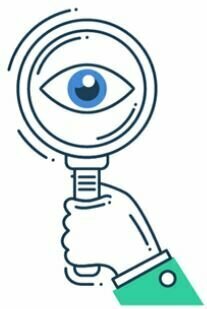
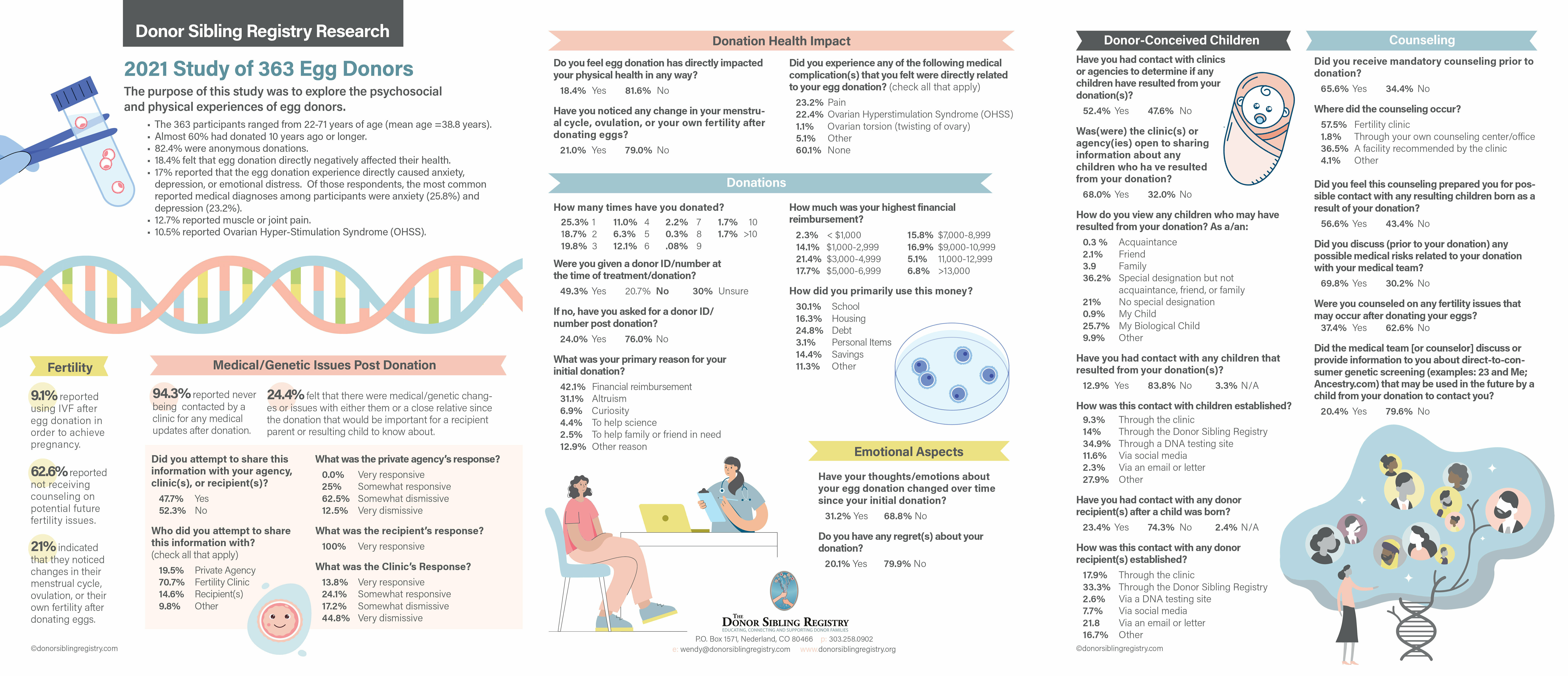
2021-2022: Egg Donor Research, Collaboration with the University of Illinois at Chicago Dept. of Population Health Nursing Science/ Dept. of Obstetrics & Gynecology
Background: The use of donated oocytes to establish pregnancy is escalating. Despite this trend, there is little knowledge about the medical and psychosocial health and disclosure habits of women who donate oocytes.
Purpose: The purpose of this dissertation study is to explore what medical and psychosocial problems oocyte donors have experienced post-initial donation and to understand if these women have disclosed to family, friends, or offspring.
Implications: These findings will serve to illuminate foundational knowledge about areas for improving medical health and needed education and counseling for psychological well-being and disclosure for former and future oocyte donors. NOTE: This study yielded 345 completed surveys and will be presented at the MNRS (Midwest Nursing Research Society) conference in March of 2022 and at the American College of Nurse-Midwives annual meeting in May of 2022.
For more published research on egg donation, see our Research page.
Interesting Facts
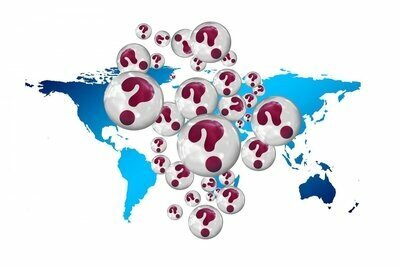
August 2024 DSR statistic: 3,588 egg donors are now registered on the DSR, compared to 1,812 sperm donors. The increased number of registered egg donors is because facilities such as Kindbody, Embryo Connections, Egg Donor Solutions, Vios, Idaho Center for Reproductive Medicine, Fertility Centers of Illinois, San Diego Fertility Center, and Oregon Reproductive Medicine are regularly writing the DSR into their parent/donor agreements so that connecting can happen right from pregnancy/birth.


 Browse by Clinic
Browse by Clinic
 Become a Member
Become a Member

Thank you for EVERYTHING you do that makes it possible for these connections to be forged. We are proud and honored to work with the DSR! We’re registering every donor...
Each year I see more intended parents who want to make sure their child one day "has the option" to meet their donor if they wish. As an agency I...
More and more of our recipient and donor pairs hope to sign up for the Donor Sibling Registry. We often have comments about how helpful you are as facilitator.
Just wanted to send a note to say how much our clinic appreciates this option for our patients. Currently our office only offers anonymous embryo donation. However, some of our...
Thanks for all you do and the education you have given many in this industry. Your passion and your son's passion has been a great push for all of us.
While exploring the idea of Egg Donation to build a family there are unknown scenarios that families may encounter. It is simple for both intended parents and egg donors to...
We used an egg donor and had a gorgeous baby girl who is now 9 months old. We struggled with how best to tell her about her origins. We wanted...
I wanted to take a minute and thank you for going the extra mile to get us in contact with our egg donor. We are beyond elated to have established...